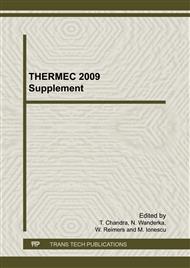p.721
p.727
p.733
p.739
p.745
p.751
p.757
p.763
p.769
The Effects of Friction and Lubrication on Multipass Hot Deformation
Abstract:
Plane strain compression tests have been carried out to investigate the variation of friction coefficient for the ferritic stainless steel, AISI 430, during single and multi pass hit deformation using glass lubricant and BN. A graphical method has been employed to evaluate the friction coefficient. It is found that the friction coefficient declines as strain increases under slip friction conditions with glass lubricant. On the contrary, under partial sticking friction condition with BN, the friction coefficient increases as strain increases. Furthermore, the variation of the friction coefficient on multipass hit is almost identical with single hit until the second pass, but the value of the friction coefficient on the third pass is slightly higher than that observed following single pass deformation.
Info:
Periodical:
Pages:
745-750
DOI:
Citation:
Online since:
January 2010
Authors:
Keywords:
Price:
Сopyright:
© 2010 Trans Tech Publications Ltd. All Rights Reserved
Share:
Citation:


